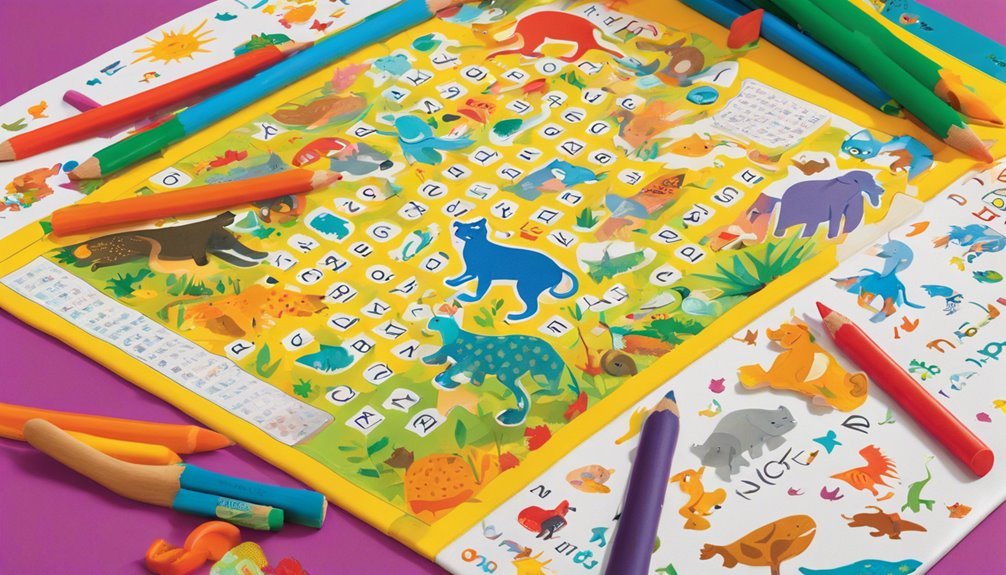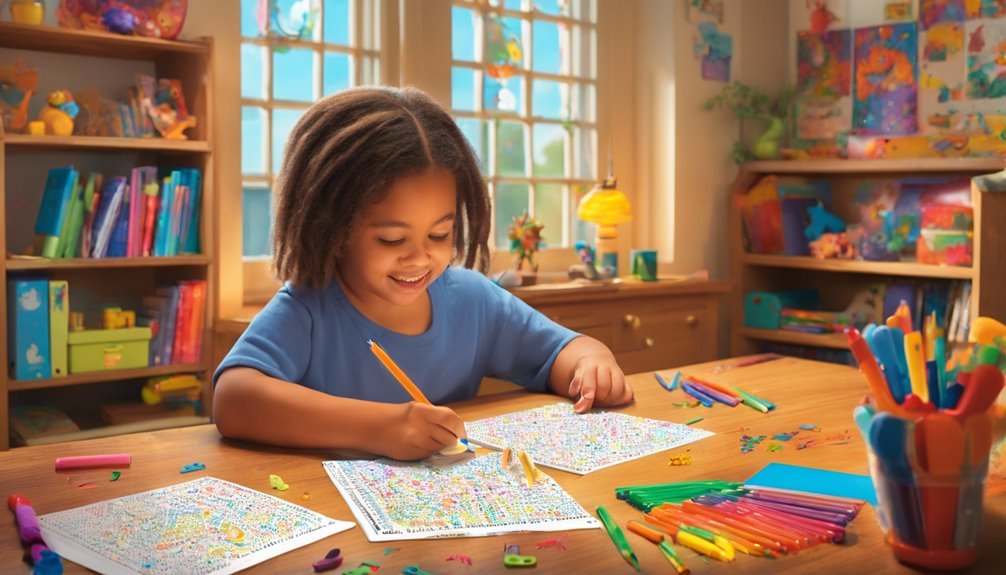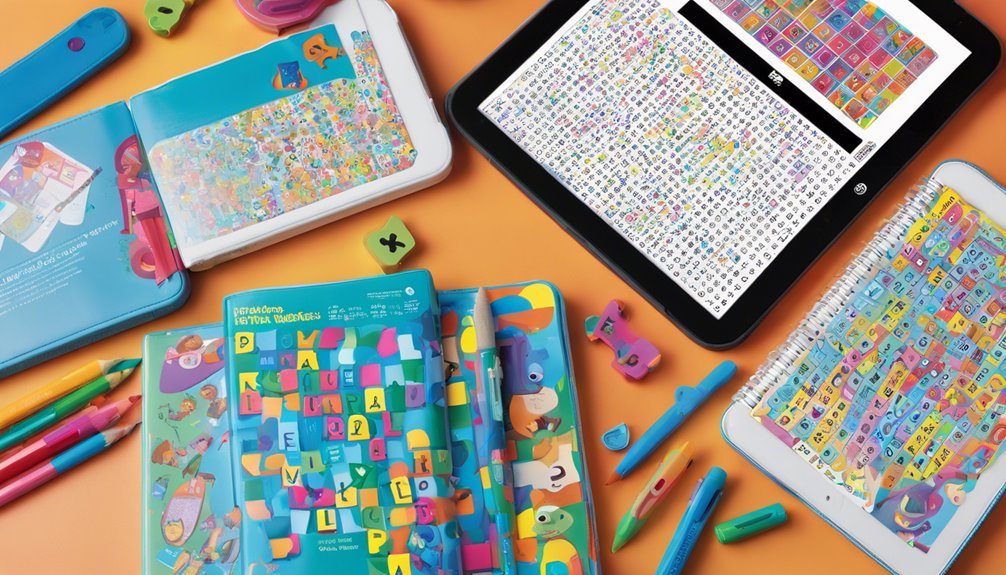"Cherishing Little Steps - A Haven for Baby and Family Journeys"
Themed Word Search Puzzle Books for Young Learners
Word searches can be both a fun game and a powerful learning tool. Imagine uncovering hidden words while exploring fascinating themes like animals and space! These puzzles not only challenge your mind but also help you grow your vocabulary. Curious about how you can incorporate these engaging activities into your learning routine? Let's explore the benefits and creative ways to make word searches a part of your educational journey.
Key Takeaways
- Themed word search puzzle books engage young learners with captivating topics, making learning enjoyable and interactive.
- They enhance vocabulary by introducing new words related to various themes, from animals to space.
- These books promote critical thinking skills by encouraging pattern recognition and problem-solving.
- Incorporating themed puzzles into lesson plans boosts vocabulary acquisition and reinforces learning concepts.
- Themed word searches can be created by students, fostering creativity and deeper understanding of vocabulary.
Benefits of Themed Word Search Puzzles
Themed word search puzzles are like treasure maps for young learners, guiding them through a fun and educational adventure.
As you dive into these puzzles, you'll boost your cognitive development by sharpening your problem-solving skills and enhancing your vocabulary. Each themed puzzle invites you to explore new concepts, making learning feel like a game.
You'll find yourself immersed in thematic engagement, where words come alive through captivating topics. Solving these puzzles isn't just about finding words; it's about connecting ideas and expanding your knowledge.
Plus, you'll develop focus and patience as you search for that elusive word. So grab a pencil, and let's embark on this exciting journey together!
You're bound to uncover treasures of knowledge along the way.
Popular Themes for Young Learners
Have you ever wondered what makes word search puzzles so exciting for young learners? Themed puzzles grab attention and spark curiosity!
Here are some popular themes that kids love:
- Animal themes: Explore the wild world!
- Seasonal themes: Celebrate every season!
- Space themes: Blast off into the universe!
- Food themes: Savor delicious vocabulary!
- Transportation themes: Travel through words!
These themes not only entertain but also enrich knowledge.
From fairy tales to sports, each puzzle invites kids to dive into new adventures. Whether they're searching for ocean creatures or nature wonders, these engaging topics keep learning fun and interactive.
Enhancing Vocabulary Through Word Searches

While you might think of word searches as just a fun puzzle, they actually play a crucial role in enhancing vocabulary for young learners.
By diving into themed word searches, you're not just playing a game; you're engaging in vocabulary building! Each puzzle introduces new words related to exciting themes, making learning more enjoyable.
As you search for words, you'll also start recognizing patterns and connections within the language. Why not challenge yourself to find synonyms or use the words in sentences once you spot them?
These language games spark curiosity and encourage exploration, allowing you to master vocabulary in an interactive way.
Encouraging Critical Thinking Skills
As you dive into a word search puzzle, you mightn't realize that it's also a fantastic way to sharpen your critical thinking skills.
By engaging with these puzzles, you develop problem-solving strategies and enhance your analytical thinking. Here's how:
- Spot Patterns: Recognize word formations and sequences.
- Think Laterally: Approach the puzzle from different angles.
- Improve Focus: Sharpen your attention to detail.
- Boost Memory: Recall words and their meanings.
- Foster Patience: Learn to persist through challenges.
These activities not only make solving fun but also build essential cognitive skills.
Incorporating Word Searches Into Lesson Plans

Integrating word searches into your lesson plans can be a game-changer for young learners, making learning not only effective but also enjoyable. By using word search integration, you're encouraging vocabulary acquisition and enhancing spelling skills in a fun way.
Try incorporating themed puzzles that align with your lesson plan strategies—like a science-themed word search during a biology unit.
Engage your students by having them create their own puzzles related to the topics you've covered. This not only reinforces their understanding but fosters creativity.
You can also use word searches as warm-up activities or quick assessments to gauge comprehension. With these approaches, you're transforming traditional lessons into interactive experiences that keep young minds eager to learn!
Tips for Choosing the Right Puzzle Book
Choosing the right puzzle book can elevate your classroom activities and keep your young learners excited about learning. Here are some tips to help you select the perfect puzzle book:
- Consider the age appropriateness: Make sure the puzzles match your students' age and skill levels.
- Check the puzzle difficulty: Start with easier puzzles to build confidence, then gradually increase the challenge.
- Look for themes: Choose books with themes that interest your students, like animals or space.
- Assess the layout: Ensure the puzzles are visually appealing and easy to read.
- Include answer keys: Having answer keys can help you guide students and check their progress.
With these tips, you'll find a puzzle book that engages and challenges your young learners!
Creating Your Own Themed Word Searches

When you create your own themed word searches, you can spark your students' creativity and make learning even more fun!
Start with theme selection—think about what interests your students. Whether it's animals, space, or a favorite book, choose a theme that excites them.
Next, dive into word search creation. List relevant words that fit your theme, ensuring they're age-appropriate and challenging. Arrange them in a grid, mixing directions—horizontally, vertically, and diagonally—to keep it engaging.
You can even invite your students to help in the process! Share the finished puzzle with them, and watch their faces light up as they search for the hidden words.
It's a fantastic way to reinforce learning while having a blast together!
The Role of Parents in Puzzle Activities
Puzzle activities aren't just for students; parents play an important role in making them even more enjoyable and effective! Your involvement can boost puzzle engagement and reinforce learning.
Here's how you can make a difference:
- Join in the fun: Solve puzzles together to share strategies.
- Encourage discussion: Ask questions about their thought process while solving.
- Celebrate achievements: Acknowledge their progress, whether big or small.
- Create a routine: Set aside regular puzzle times to build consistency.
- Explore themes: Help them pick themed word searches that ignite their interests.
Digital vs. Print Word Search Options

In today's world, you've got two exciting options for word searches: digital or print.
Digital word searches offer fantastic accessibility, letting you play anytime, anywhere! You can easily swipe, tap, and even share with friends. Plus, they often come with fun sound effects that make the experience lively!
On the other hand, print word searches have their own charm. They boast durability, allowing you to scribble and highlight without worrying about screens. You can cozy up with a book, create a colorful masterpiece, or even challenge a friend in a friendly competition.
Ultimately, whether you choose digital or print, both options have unique benefits that can enhance your word search adventures!
Which one are you excited to try?
Engaging Reluctant Learners With Fun Themes
If you want to spark interest in reluctant learners, themed word searches can be a game-changer!
These interactive activities not only make learning enjoyable but also boost student motivation.
Here are some engaging themes you could explore:
- Animals and their habitats
- Outer space adventures
- Underwater exploration
- Superheroes and their powers
- Dinosaurs and prehistoric life
Frequently Asked Questions
What Age Group Is Best Suited for Themed Word Search Puzzles?
When you're considering what age group suits themed word search puzzles, think about preschool readiness and cognitive development.
Kids around ages 4 to 7 are perfect because they're building essential skills. These puzzles help them recognize letters and words while having fun!
You'll notice how engaged they become as they search for words that connect to their interests. So, dive in and watch their confidence and mastery grow through these delightful challenges!
How Can Themed Word Searches Be Made More Challenging?
You're ready to elevate your word search game, but how?
Start by introducing advanced vocabulary that'll make you think twice. Imagine racing against the clock—timed challenges add an exhilarating twist!
Set a countdown and feel that thrill as you search. Mix in some tricky patterns or hidden words that overlap, and you'll find yourself on a quest for mastery.
Get ready; it's about to get intense and rewarding!
Are There Specific Learning Objectives for Using Word Searches?
Absolutely, there are specific learning objectives for using word searches!
They're great for cognitive development, as they boost problem-solving skills and critical thinking. You'll also notice vocabulary enhancement, helping you learn new words in a fun way.
As you tackle each puzzle, you're actively engaging with the material, strengthening your memory and word recognition.
Can Themed Word Searches Aid in Language Learning for ESL Students?
Absolutely! Themed word searches can boost your vocabulary enhancement while making language learning fun.
As you look for words, you'll not only memorize new terms but also explore cultural awareness tied to those themes. You'll discover connections between language and culture, enriching your understanding.
Plus, you can challenge friends or classmates by racing to find words, making it an interactive experience that deepens your mastery of English.
Dive in and enjoy!
How Often Should Kids Engage With Word Search Puzzles?
To boost your skills, kids should engage with word search puzzles a few times a week. This frequency helps sharpen their cognitive abilities, enhancing problem-solving and vocabulary retention.
Don't just complete them—try timing yourself or racing against a friend! Mixing it up keeps it fun and challenging.
Conclusion
Imagine a treasure map leading to a hidden world of words, where each puzzle is a clue guiding you through adventures in animals, space, and food. As you uncover these hidden gems, you're not just finding words—you're building skills and confidence! So grab your magnifying glass and embark on this exciting journey. Together with your friends, family, or even solo, let's explore the wonders of themed word searches and unlock the treasure of learning!

